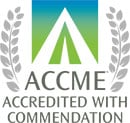Continuing Medical Education
Accreditation Statement

The American Association for Cancer Research (AACR) is accredited by the Accreditation Council for Continuing Medical Education (ACCME) to provide continuing medical education activities for physicians.
CREDIT DESIGNATION STATEMENT
AACR has designated this live activity for a maximum of 386.75 AMA PRA Category 1 Credit(s)™. Physicians should only claim credit commensurate with the extent of their participation in the activity.
Credit certification for individual sessions may vary, dependent upon compliance with the ACCME Accreditation Criteria. The final number of credits may vary from the maximum number indicated above.
CLAIMING CME CREDIT
Credit Survey: All individuals requesting continuing medical education credits must complete a CME Request for Credit Survey by Wednesday, May 22, 2024. The Request for Credit Survey will be accessible by logging into the AACR Annual Meeting 2024 Program Planner and via email. Registrants log on using their registration number and last name.
General instructions for claiming CME/CE credit: If you built a “My Itinerary” schedule, from “My Itinerary” click on “Add all eligible Sessions to Credit Cart”.
If you did not build a “My Itinerary” schedule, add the sessions you attended by browsing sessions by day, by session category, or by session. Click the “Add to Cart” icon to the right of each CME eligible session. (Note: non -CME sessions will not have this “Add to Cart” option.)
Print CME Certificate: Print your CME Certificate by clicking “CME Certificates” on the menu at right in the Program Planner Credit Cart.
abim moc statement

Successful completion of this CME activity, which includes participation in the evaluation component, enables the participant to earn up to 386.75 Medical Knowledge MOC points in the American Board of Internal Medicine’s (ABIM) Maintenance of Certification (MOC) program. Participants will earn MOC points equivalent to the amount of CME credits claimed for the activity. It is the CME activity provider’s responsibility to submit participant completion information to ACCME for the purpose of granting ABIM MOC credit.
To receive ABIM MOC, participants must complete all questions in the CME Request for Credit Survey and claim CME credit hours. Please then select “Request MOC Points Here” on the bottom right side of the screen. Once these steps are completed, AACR will submit your completion information via the ACCME’s Program and Activity Reporting System for the purpose of granting MOC points.
Statement of Educational Need, Target Audience, and Learning Objectives
The fight against cancer is rapidly progressing with the accelerating pace of discoveries in the basic, translational, and clinical sciences. This is due in large part to the advent of new technologies, such as advanced live imaging techniques and liquid biopsies, and our increased understanding of the importance of harnessing the power of the immune system to develop new immunotherapies. However, understanding and combating the processes of cancer initiation, progression, and response to treatment require a convergence of various disciplines. The AACR Annual Meeting brings together cancer biologists, clinical oncologists, and population scientists with engineers, computational biologists, and physical scientists to develop quantitative approaches and ask new questions to develop better strategies for curing cancer. By bridging the gap between what physicians understand about cancer biology and the clinical applications, this meeting aids basic researchers, physicians, and clinician-scientists in obtaining, synthesizing, and integrating the most current molecular-based tests to aid in the diagnosis, treatment, and prevention of cancer. Further, facilitating the interface between physicians and scientists increases the contributions of laboratory research to drug development as well as patient care, transforms the design and conduct of clinical research protocols, and creates an avenue for the rapid translation of laboratory research findings from “bench-to-bedside” for the benefit of improving patient outcomes. This meeting also acts as a forum to discuss cancer disparities and help ensure that all patients benefit from emerging breakthroughs in research and cancer treatment.
Despite the tremendous progress in the field, cancer continues to be a global public health challenge, accounting for one in every six deaths that occur around the world. The five leading causes of cancer-related morbidity were cancers of the lung, colon and rectum, stomach, breast, and liver. In the United States (U.S.), it is estimated that there will be 1,958,310 new cases of cancer in 2023 and that 609,820 people will die from some form of cancer, making it the second most common cause of death after heart disease. While overall cancer incidence in the U.S. has stabilized in recent years, certain cancer types are steadily increasing. One of the challenges we face is that cancer comprises more than 200 different diseases. Another challenge is that there are disparities in incidence, diagnosis, access to care, and survival rates that are driven by social determinants of health, and the burden of cancer is therefore shouldered disproportionately by certain segments of the population, including racial and ethnic minorities and individuals from other medically underserved populations.
The AACR Annual Meeting historically brings together over 22,000 investigators from the basic, translational, and clinical disciplines and provides them with a venue to discuss their recent advances, test new hypotheses, and establish new collaborations. To provide the most advanced technologies and treatments, it is critical to bridge the gap between physicians who are answering fundamental questions about cancer biology, clinicians who are applying the latest diagnostics and treatment strategies to patient care and the basic, translational, population and computational scientists who are striving to recognize and eliminate cancer disparities. As the incidence of cancer continues to increase, the fields of cancer prevention, advanced detection, and early interception offer unprecedented opportunities to decrease the worldwide burden of cancer.
After participating in this CME activity, physicians should be able to:
- Assess the technological and computational advances and tools being used to accelerate progress in cancer research and improve early detection and early interception, with the ultimate goal of extending patients’ lives and improving their quality of life.
- Articulate how advances in precision cancer medicine are leading to improved patient outcomes.
- Incorporate the latest research findings regarding therapies and treatment options, including immunotherapy and combination therapies, in a variety of cancer types to improve patient outcomes.
- Evaluate the impact of tumor evolution in developing resistance to therapy and exploit tumor heterogeneity to design improved strategies for cancer prevention, interception, and treatment.
- Identify factors that impact the diagnosis, treatment, and prevention of various forms of cancers in patients from diverse populations and contribute to reducing cancer disparities.
- Develop collaborations among physicians, researchers, and clinician-scientists to advance approaches for cancer treatment and prevention and support survivors.
DISCLOSURE STATEMENT
It is the policy of the AACR that the information presented at AACR CME activities will be unbiased and based on scientific evidence. To help participants make judgments about the presence of bias, AACR will provide information that Scientific Program Committee members and speakers have disclosed about all financial relationships they have with ineligible companies whose primary business is producing, marketing, selling, re-selling, or distributing healthcare products or services used by or on patients. All of the relevant financial relationships for these individuals have been mitigated.
Acknowledgment of Financial or Other Support
The AACR gratefully acknowledges the following commercial supporters for their Professional Educational Grants:
PROFESSIONAL EDUCATION GRANTS
- AbbVie
- AstraZeneca
- Boehringer-Ingelheim
- Incyte
- Merck
- Novocure
- AstraZeneca-Hematology
- Beigine
- Daiichi-Sankyo
- Lilly
- Novartis
- Pfizer
Questions about CME?
If you still have questions, contact the Office of CME at (215) 440-9300 or [email protected].
